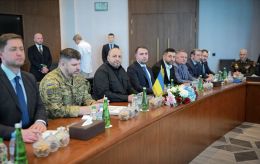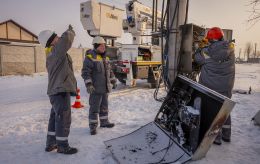Georgian Maidan: Could protests in Tbilisi erupt into revolution
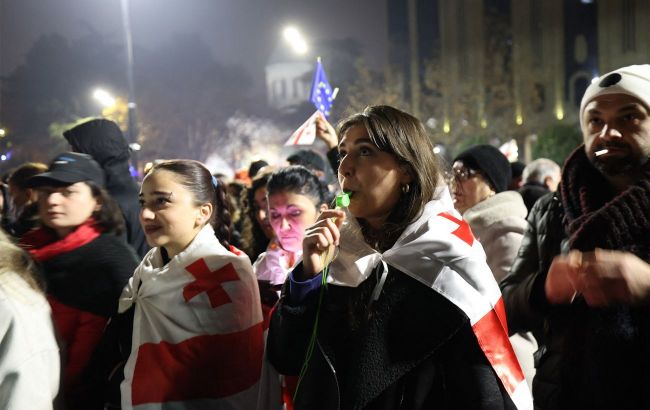 Protesters in Tbilisi (photo: Getty Images)
Protesters in Tbilisi (photo: Getty Images)
Protests against the ruling pro-Russian party Georgian Dream continue in Tbilisi. They were triggered by the authorities' decision to halt the country's Eurointegration efforts.
What is the dynamic of the protests in Georgia, and could they escalate into a full-blown revolution? Read on in the article by RBC-Ukraine.
Contents
Protests have been ongoing for several days in Georgia against the government’s rollback of the country's pro-European course implemented by the ruling pro-Russian party Georgian Dream. The reasons behind the protests are multifaceted, including dissatisfaction with government actions, restrictions on political freedoms, suppression of independent journalism, and the increasing influence of Russia on the country.
The situation escalated sharply after the parliamentary elections on October 26, when Georgian Dream attempted to secure a constitutional majority. While they failed due to the mobilization of pro-European voters, the party won a simple majority with 54% of the vote. Opposition forces alleged election fraud, sparking protests that initially yielded no tangible results.
Tensions flared again when the government, buoyed by its election victory, announced the suspension of European integration. On November 28, Georgian Prime Minister Irakli Kobakhidze stated that the country would not begin EU accession talks before the end of 2028.
Situation on the streets
“This is a confrontation between the Georgian people - practically its absolute majority - against Russian authorities. I don’t even say ‘pro-Russian authorities’ anymore because what the Georgian government is doing is clearly a Kremlin directive. Essentially, this is a struggle of the Georgian people for independence,” Mamuka Mamulashvili, commander of the Georgian Legion fighting with the Armed Forces of Ukraine, told RBC-Ukraine.
Tensions are extremely high on both sides. Despite cold weather, police are using water cannons. On December 2, Georgia’s Ministry of Internal Affairs reported 224 protesters detained for administrative offenses and three for criminal charges. More than 100 police officers required medical attention. However, day by day - or rather night by night - the confrontation becomes more intense.
“The wave of protests is gaining strength. I attended all three rallies and can say that the growth dynamic is evident. The day before yesterday, there were about 50,000 people. Yesterday, around 100,000 gathered on Rustaveli Square,” Vakhtang Maisaya, an expert from the Foreign Policy Research Center OPAD in Georgia, told RBC-Ukraine.
The number of protest locations has also increased. On December 1, rallies were held at four points in Tbilisi.
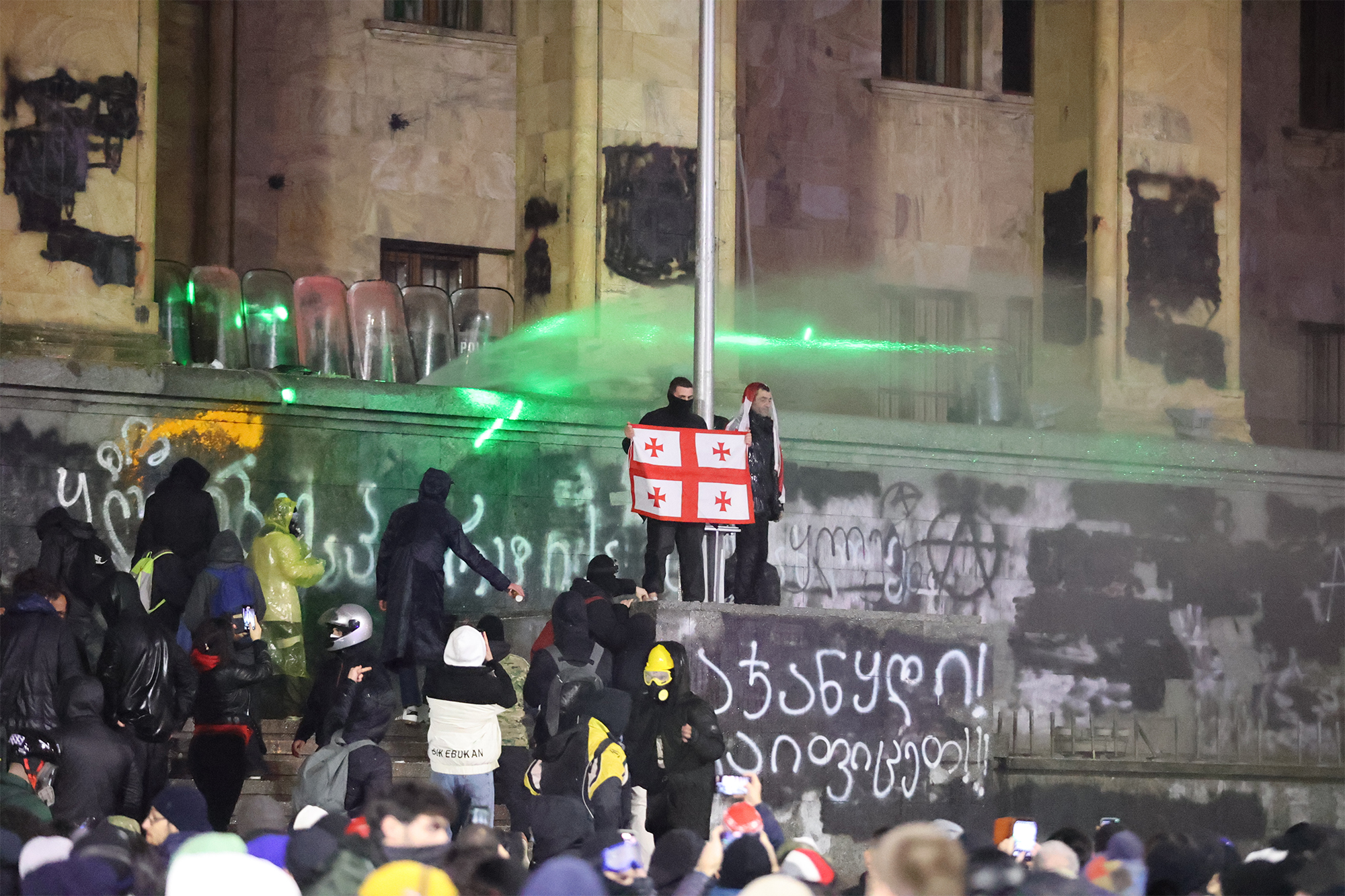
Protest in Tbilisi (Photo: Getty Images)
Maisaya compares Georgian law enforcement to the Tonton Macoutes (paramilitary forces under Haiti’s dictator Duvalier in the 1950s-60s). According to him, Georgian law enforcement has already become comparable to mercenaries, acting outside the constitution, with methods borrowed from Russia’s OMON and National Guard.
At the same time, despite several days of protests, demonstrators have not been able to secure ground by creating an equivalent of Ukraine’s Maidan during the Orange Revolution in 2004 and the Revolution of Dignity in 2014. On the night of December 2, Georgian police and special forces once again cleared Rustaveli Avenue, Tbilisi’s main thoroughfare. However, Mamulashvili believes that “setting up tents there achieves nothing” because the government opposes the people, not vice versa.
“Setting up tents doesn’t determine whether the protests will continue. They will continue regardless until the Georgian people achieve their legitimate goal: to hold repeat elections and stop vote theft,” Mamulashvili emphasized.
External factors – USA, EU, and Russia
Another factor that may influence the situation in Georgia is external involvement. The reaction of Western countries remains cautious. The United States announced the suspension of its strategic partnership with Georgia, according to State Department spokesperson Matthew Miller. EU High Representative for Foreign Affairs and Security Policy, Kaja Kallas, expressed support for the Georgian people and their choice of a European future. She also stated that the use of force against demonstrators would have "direct consequences."
This could mean sanctions against members of the Georgian Dream party who are responsible for suppressing protests, notes Politico. The decision might be made at the next EU Foreign Ministers' meeting on December 16. However, another source indicated that sanctions could be imposed at any time.
The EU also possesses more significant leverage. In September, several European media outlets reported that the EU might suspend Georgia's visa-free regime. This would harm the country's tourism industry and restrict Georgians' ability to work in EU countries.
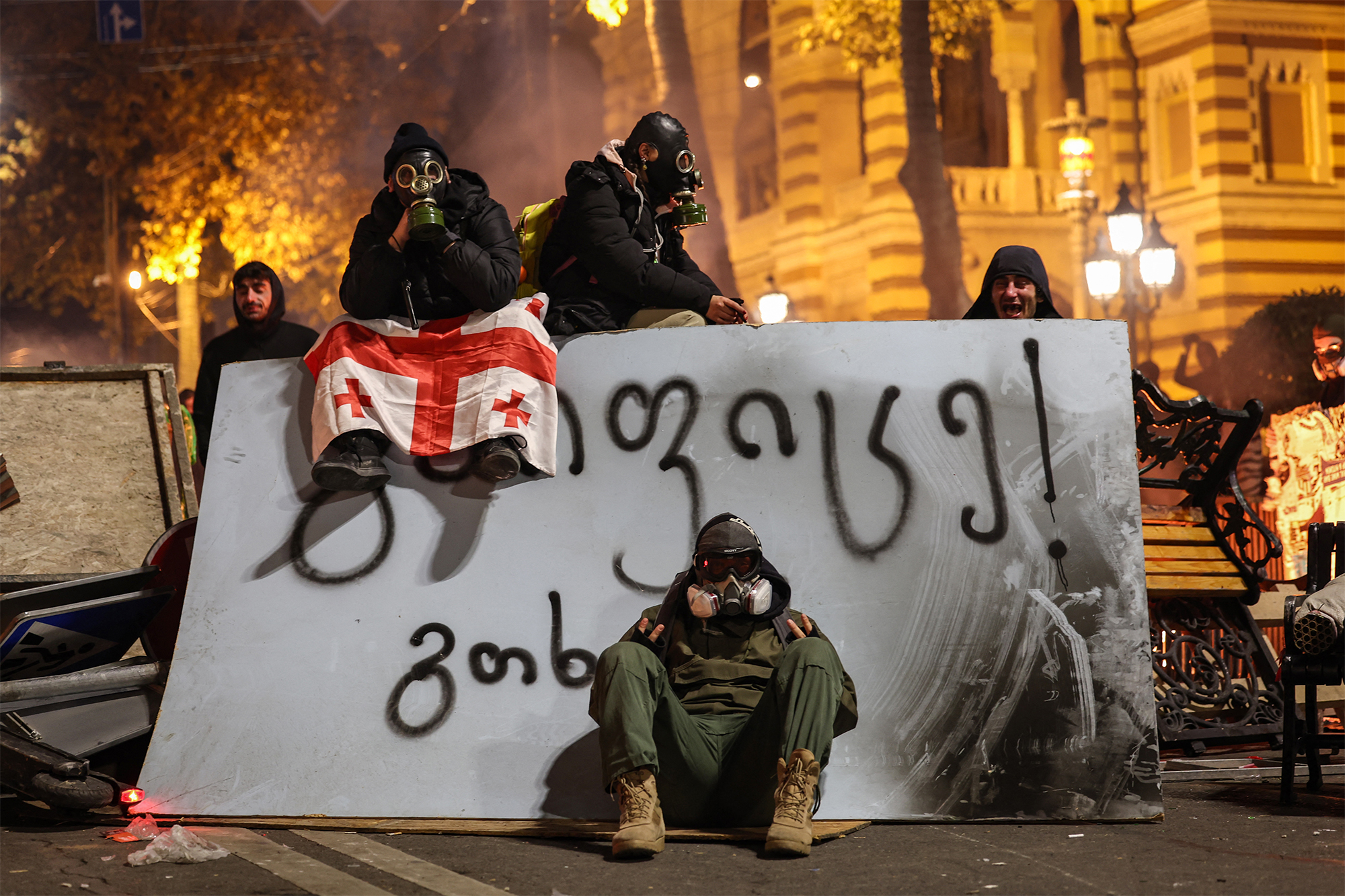 Protesters preparing for clashes with the police (Photo: Getty Images)
Protesters preparing for clashes with the police (Photo: Getty Images)
At the same time, Georgian authorities may count on support from Russia. The Georgian Dream party has long been accused of ties to the Kremlin, especially given that party leader Bidzina Ivanishvili has longstanding business interests in Russia. On December 2, Kremlin spokesperson Dmitry Peskov stated that events in Georgia resemble those that occurred on Kyiv's Maidan Nezalezhnosti (Independence Square) in 2013.
"The Kremlin has prepared for this and is now waging not only a hybrid war in the informational and psychological domain within Georgia but also a cognitive war. Pro-Russian propagandists are now coming out of their hiding places," said Maisaya.
According to him, Russia has several scenarios for Georgia, depending on whether the Georgian Dream remains in power. If a revolution does occur, the expert did not rule out that Russia might expand its occupation zone, attempting to seize not only South Ossetia and Abkhazia but also other regions of Georgia.
Are there leaders of the protest?
The protests have a legitimate leader - the current President of Georgia, Salome Zourabichvili. However, as Georgia is a parliamentary republic, the president has limited powers. One of Zourabichvili's main advantages is her ability to represent protesters in communication with foreign leaders. However, she also faces criticism.
"She represents the government we've had for the past 12 years. I don’t consider her legitimate, even her involvement in such events. Thousands of political prisoners exist in Georgia, yet she hasn’t pardoned almost any of them. While she has the legitimacy and many tools to do so, she hasn’t acted on it. In my view, her role is limited to being a controlled opposition figure for the Georgian government," said Mamuka Mamulashvili.
As for other protest leaders, they are primarily a coalition of opposition forces that ran in parliamentary elections. However, their defining role in the protests is limited.
"The opposition is very weak, disunited, and doesn’t act in unison. This is more of a popular protest than a politically driven one in Georgia," added Mamulashvili.
Meanwhile, Maisaya noted in a comment to RBC-Ukraine that political opposition leaders face a formidable opponent.
"The leaders have created a united resistance center under the legitimate President Salome Zourabichvili, but I must say that the opposition forces are vastly unequal. They are fighting not just Georgian Dream as a branch of United Russia (the ruling party in the Russian Federation - Ed.) but also highly trained Kremlin strategists," Maisaya emphasized.
Enough factors are working in favor of both sides in the confrontation. However, some factors are yet to manifest. One of the main ones is external support, which could either bolster the protesters or weaken the resolve of those defending the Georgian Dream.
Sources: statements from Georgian politicians, data from Georgia’s Ministry of Internal Affairs, photos and videos of protests from open sources, comments from the commander of the Georgian Legion, Mamuka Mamulashvili, and expert insights from Foreign Policy Research Center OPAD, Vakhtang Maisaya.
